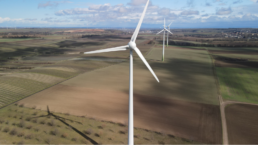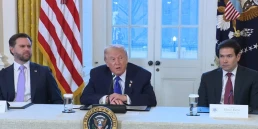A new chancellor and his coalition want to enact major clean energy legislation at the same time that the war has scrambled the geopolitics of energy.
By Dan Gearino, Inside Climate News
Vladmir Putin’s invasion of Ukraine has made Germany’s reliance on Russian oil and gas untenable, and led the center-left government of Chancellor Olav Scholz to accelerate the transition to clean energy.
This is more than just talk. German leaders are in the early stages of showing the world what an aggressive climate policy looks like in a crisis. Scholz and his cabinet will introduce legislation to require nearly 100 percent renewable electricity by 2035, which would help to meet the existing goal of getting to net-zero emissions by 2045.
“Our goal of achieving climate neutrality in Germany by 2045 is more important than ever,” Scholz said this week in an address to parliament.

Germany’s strategy is in contrast to the United States, where the Biden administration, also elected with ambitious climate plans, has seen that part of its agenda almost completely stalled.
The difference is that Germany—and much of the rest of Europe—have a head start on the United States in making a transition to clean energy, said Nikos Tsafos of the Energy Security and Climate Change Program at the Center for Strategic and International Studies, a Washington-based think tank.
“There is more social and political consensus in favor of decarbonization [in Europe], and the plans and strategies are far more developed,” Tsafos said in an email. “By contrast, climate legislation remains highly politicized in the United States, and the instinct among many is to merely increase oil and gas production.”
Germany’s actions on climate and clean energy hold special relevance for the United States because both nations have large economies built on heavy industry and plentiful fossil fuels. Germany adopted groundbreaking renewable energy incentives in the 2000s, making it a model for others. It has continued since then with decades of progress, along with a recurring theme of frustration that progress has often not been fast enough.
Scholz and his coalition want to build on this legacy, even as bullets and artillery rounds are flying in Ukraine.
Recent Posts
‘Uninvestable’: Oil Execs Rebuff Trump’s Demands For $100bn Investment In Venezuela
January 12, 2026
Take Action Now The US Energy Secretary denies ‘stealing’ Venezuelan oil, despite a plan to hold revenues in offshore accounts under US…
Want To Stop ICE? Go After Its Corporate Collaborators
January 12, 2026
Take Action Now ICE can’t function without help from the private sector. So we should force the private sector to stop helping.By Eric Blanc,…
Organized Labor Lambastes Trump’s Attack on Venezuela
January 11, 2026
Take Action Now Unions and international labor federations argue that it’s the same billionaires that want to run Venezuela who keep us working…
Schumer, Jeffries Refuse to Join Democrats’ Growing Calls to Slash ICE Spending
January 10, 2026
Take Action Now “I just don’t understand how we provide votes for a bill that funds the extent of the depravity,” said Sen. Chris Murphy.By Julia…




